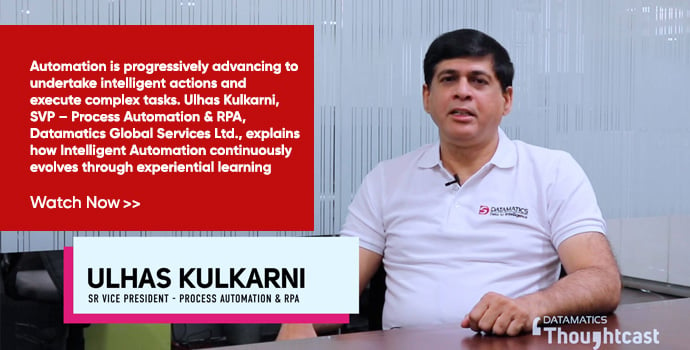4 Advantages of Investing in Intelligent Automation (IA)
by Ulhas Kulkarni, on Feb 14, 2020 10:29:57 PM
Estimated reading time: 2 mins
Revenue erosion due to failure in stepping in with modern business automation trends has been a topic of discussion for quite some time. According to industry analysts, early adopters of technologies, such as Intelligent Automation, flourish due to improved business margins. They reap immense benefits due to Intelligent Automation and move to an elevated position, where their business gets supported by a sustainable margin performance. Those that fail to invest in the evolving automation technologies witness faster revenue as well as margin erosion because from time-to-time they are compelled to lower prices without building on the capability to reduce delivery costs brought in by automation.

The evolving technology scenario
Desktop Automation and Robotic Process Automation (RPA) are being used in wider business pockets – a definite quantum leap than the screen scraping age. Today, with the advancements in the Artificial Intelligence (AI) / Machine Learning (ML) field, most enterprises are taking off along the Intelligent Automation path. Tasks that were fairly difficult to handle even with RPA are now performed with high precision using Intelligent Automation. Invoice processing, customer service request processing, claim processing, and enterprise data management are just few among the number of tasks that are performed with very high levels of accuracy. The more data that the Intelligent Automation system processes, the more intelligent it becomes through experiential learning.
4 advantages of Intelligent Automation
Intelligent Automation takes the RPA paradigm much further. It is in fact RPA infused with AI/ML. Intelligent Automation brings in tremendous benefits in the form of monitoring, listening, analyzing, and executing capabilities into play by using the continuous learning paradigm of AI/ML:
- Monitoring: Enterprises can continuously monitor business KPIs in real-time by augmenting siloed infra to highlight different patterns in business activity as a whole. Highly interactive dashboards built using data science & analytics and visualization elements can flag off outliers for quick intermediation.
- Listening: Enterprises adopting Intelligent Automation can make active listening and responding to social media, email, and other communication modes a part of their business model by processing structured as well as highly unstructured data.
- Analyzing: Businesses can analyze trends and patterns to naturally suggest next steps due to continuous learning through active monitoring and listening. The actionable insights help to deliver value even in an extremely chaotic business environment.
- Executing: Using Intelligent Automation, enterprises can induce end-to-end automation in business processes as well as entire business functions. The mundane tasks, which were earlier automated with RPA, can be performed more intelligently to do away with the frequent human intervention.
In summary
Today, as enterprises using traditional automation systems continue to exist along with those adopting cutting-edge technologies, such as Intelligent Automation powered by AI/ML, the margin retention ratio of businesses is becoming highly skewed. Enterprises co-existing in the evolving business scenario need to adopt industry best practices to improve revenues as well as margins and STAY AHEAD even in the changing times.


















